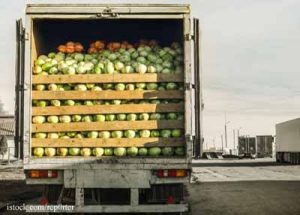A new study conducted at the University of Markansas at Fayetteville has found that Salmonella and other foodborne pathogens attach to reusable plastic containers used in industry and remain even after cleaning. Those pesky biofilms are, again, the culprit.
 Scientists looked at the materials used to make these food containers that are used to transport fruits and vegetables to grocery stores. In the study, researchers let Listeria monocytogenes, Salmonella, and E. coli O157:H7 bacteria to grow on the reusable plastic container (RPC) surface and then cleaned and sanitized the containers according to industry standards. In all cases, the material still had biofilms that protected the bacteria even after cleaning.
Scientists looked at the materials used to make these food containers that are used to transport fruits and vegetables to grocery stores. In the study, researchers let Listeria monocytogenes, Salmonella, and E. coli O157:H7 bacteria to grow on the reusable plastic container (RPC) surface and then cleaned and sanitized the containers according to industry standards. In all cases, the material still had biofilms that protected the bacteria even after cleaning.
Biofilm is a kind of slime made of protein that surround the bacteria, allow them to communicate with each other, and protect them from disinfectants. What was striking about this study, the bacteria “not only attached to the RPC but could not be dislodged by either sanitizers or physical scrubbing.”
Researchers used hot water plus alkaline detergent, quaternary ammonium, hot water plus alkaline detergent plus chlorine, and chlorine to clean the containers after they were inoculated with the bacteria. The surfaces were examined with a scanning electron microscope; bacteria were found on every single sample.
This study may explain the food poisoning outbreaks linked to fresh produce that have plagued this country for the past few years. In 2011, one-third of all foodborne illness outbreaks were caused by contaminated produce. The Listeria monocytogenes outbreak linked to caramel apples this past fall, the Salmonella outbreak linked to cucumbers last year, and the huge cyclospora outbreak in 2013 linked to imported produce from Mexico sickened many Americans. Those items were transported across the country to processors before being sold to the public. We must point out that there is no evidence directly linking food poisoning outbreaks to those containers, although the industry should study this matter more thoroughly as a precaution.
Other studies have had similar results. Research at the University of California-Davis found the same problem. A return to single-use containers for transporting fresh produce around the country and the world may be necessary.




